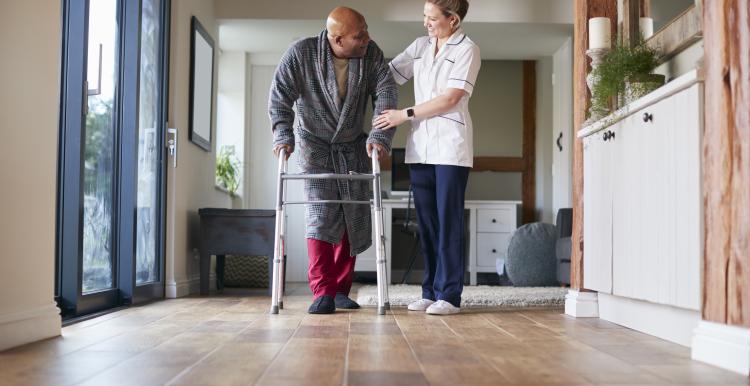Improving access to GP services in Lancashire and South Cumbria

Healthwatch Together is a collaboration of four local Healthwatch organisations: Healthwatch Blackburn and Darwen, Healthwatch Blackpool, Healthwatch Cumbria and Healthwatch Lancashire. They have come together to provide engagement support across the Lancashire and South Cumbria Integrated Care System (ICS) footprint.
The Partnership serves a diverse population of 1.8 million people. Some areas have high deprivation, such as Blackpool and Blackburn and Darwen (29.1% of the population live in some of the most deprived area in the country). 20% of adults are not meeting the recommended levels of physical activity and 18.5% of the adult population smoke.
How are they working together?
- The four local Healthwatch organisations have an agreed Memorandum of Understanding in place establishing how they will act as Healthwatch Together.
- The approach to collaborative working as Healthwatch Together is documented as an 'Our Offer' document and shared with stakeholders such as NHS organisations and local authorities.
- Healthwatch Lancashire acts as the lead organisation, sending representatives to system meetings and coordinating efforts.
- Healthwatch Together has two key forums for strategic and operational collaboration: a monthly strategic meeting where chief executives of the local Healthwatch organisations meet to discuss strategic and operational priorities; a fortnightly operational meeting where teams work together to help shape and deliver projects.
- Using these agreed approaches, Healthwatch Together responds to ICS commissions as follows: A project lead is appointed from one of the local Healthwatch organisations, based on expertise in delivering the work; resources are pooled and then reallocated to deliver the project as required depending on the population of interest, expertise and capacity to deliver; service level agreements are put in place for specific projects where relevant.
What are the enablers of working together?
- Local Healthwatch organisations in Lancashire and Cumbria have a legacy of strong working relationships with the health and care system, community and voluntary sector. This includes CCG Board representation, supporting past Sustainability Transformation Partnerships, delivering engagement activities, and developing the ICS.
- The ICS and Healthwatch Together ensure that Healthwatch is represented at key local forums, including: 1). the ICS Board and the Strategic Commissioning Committee. In these meetings, Healthwatch Together shares insight from local people to inform high-level decision making. For example, using this group Healthwatch Together has set up governance arrangements for the ICS to engage with local people. 2). The Partnership Board. This ICS sub-group brings together stakeholders and partners more directly.
- Healthwatch Together has developed a way for local people to connect and engage with the ICS, articulated in their support offer. They are also in the process of agreeing a pricing schedule with a menu of options that Healthwatch Together can offer which will enable them to respond quickly to requests for pieces of work.
- A data-sharing agreement is being developed between Healthwatch Together and the NHS across Lancashire and South Cumbria and information sharing routes have been established.
Three local lessons from working together
1. Invest in internal collaboration first: The four Healthwatch organisations needed to come together with openness and spend time developing their own trusting and transparent relationships, to build the coordinated engagement support offer for the ICS.
"We looked professional. We looked ready and have proved ourselves as a credible partner." Case study participant
2. Champion the person and be clear about the objectivity of Healthwatch: Healthwatch Together have focused on their statutory role, their independence, and their objectivity. The value of which is welcomed by the ICS.
"Our independence is our greatest asset and strength and I think the ICS has to support us to be as independent as we need to be because that's the biggest benefit to them too." Case study participant
3. Proactively offer support: Shaping the way the Lancashire and South Cumbria Health and Care Partnership engages with local people and communities has been an important opportunity for Healthwatch Together and appreciated by partners across the ICS.
"This is an opportunity for us to shape something differently and build something stronger than we've had before and that's more inclusive than we've had before and let's not miss that opportunity." Case study participant
Example of working together
Healthwatch Together has been commissioned by NHS partners across the ICS to explore local people’s perspectives, especially those from communities whose views are often overlooked, about the New Hospital Programme suggestions for Lancashire.
The plans explore the option to replace one or two local hospitals and instead access specialist clinical services from one hospital site rather than multiple sites.
To do this Healthwatch Together launched an early engagement campaign across Lancashire which will be followed up with a formal consultation process with the public.
Phase one of the engagement efforts informed the business case for the New Hospitals Programme and explored why people felt this was an important change. Phase two of engagement currently involves local Healthwatch using different methods (e.g. surveys and focus groups) to hear from seldom heard communities and vulnerable groups. These include asylum seeker and refugee communities, South Asian women, veterans, and LGBT groups.
Healthwatch Together are using their local knowledge, expertise and connections with voluntary and community groups. The aim of this engagement is to understand people’s views to inform decisions about where the new hospital will be and what services it may offer. As well as producing an independent report, Healthwatch Together is also sharing emerging learning with the project managers across the ICS to inform decision making as they go along.
This case study was produced by the Strategy Unit for Healthwatch England.
